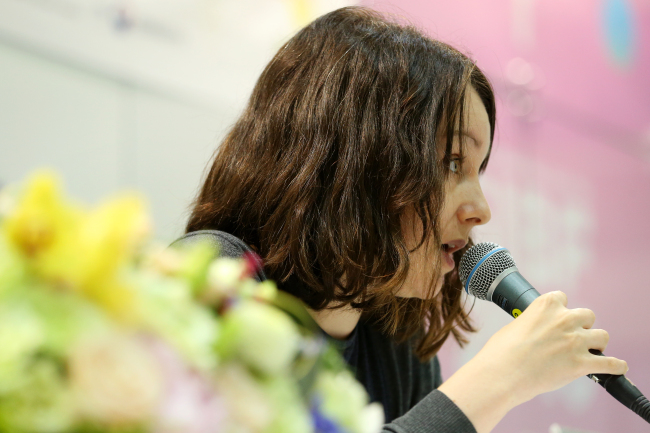Fiction should be marketed as 'good,' not 'Korean'
'No publisher is going to be interested in a book specifically or solely because it was written in Korean,' says Deborah Smith
By Rumy DooPublished : June 20, 2016 - 14:07
Writers such as Han Kang and Haruki Murakami are “rapturously received” by the international audience not because they document a certain culture or ethnicity, but because of the artistic value of their work, according to award-winning translator Deborah Smith.
“When a writer succeeds on the international stage, they become, for an audience, an international writer,” Smith said at a forum on Korean literature’s global expansion held Sunday as part of the Seoul International Book Fair. Smith jointly won the Man Booker International Prize last month for her English translation of Korean writer Han Kang’s novel “The Vegetarian.”
“Murakami is not ‘Japanese literature’ any more than Han Kang is ‘Korean literature.’ Fervent Murakami fans are not, by and large, spurred on by this passion to read more Japanese literature -- they want to read more Murakami,” the British translator said.
“Han Kang, like Murakami, has become a brand in herself ... she has gathered a following of devotees who eagerly await any book by her, safe in the knowledge that it will be beautifully written, tightly constructed, powerfully imagistic and emotionally engaging,” Smith added.
While some believe emphasis on the “Korean-ness” of books may appeal to readers as “windows onto another culture,” it rarely acts as a selling point, Smith observed. People seek out fiction not for “anthropological reports,” but for artistic works of the imagination, she said.
“When a writer succeeds on the international stage, they become, for an audience, an international writer,” Smith said at a forum on Korean literature’s global expansion held Sunday as part of the Seoul International Book Fair. Smith jointly won the Man Booker International Prize last month for her English translation of Korean writer Han Kang’s novel “The Vegetarian.”
“Murakami is not ‘Japanese literature’ any more than Han Kang is ‘Korean literature.’ Fervent Murakami fans are not, by and large, spurred on by this passion to read more Japanese literature -- they want to read more Murakami,” the British translator said.
“Han Kang, like Murakami, has become a brand in herself ... she has gathered a following of devotees who eagerly await any book by her, safe in the knowledge that it will be beautifully written, tightly constructed, powerfully imagistic and emotionally engaging,” Smith added.
While some believe emphasis on the “Korean-ness” of books may appeal to readers as “windows onto another culture,” it rarely acts as a selling point, Smith observed. People seek out fiction not for “anthropological reports,” but for artistic works of the imagination, she said.

“By marketing a Korean book as primarily that, you are marketing to an audience of those with a preexisting interest in the country.”
That audience, as of yet, is still “vanishingly small,” especially in the U.K. market, she said.
“No publisher is going to be interested in a book specifically or solely because it was written in Korean. But individual books which happen to have been written in Korean may well appeal, not because of their ‘Korean-ness,’ but because of their style, themes, genre, etc.,” she pointed out.
Smith emphasized the importance of funding organizations such as the Literature Translation Institute of Korea and the Daesan Foundation, which actively promote translated Korean literature abroad. But a state-sanctioned attempt at increasing Korea’s “brand value” or the demand for some kind of programmatic action plan -- “10 steps to Korean Literature’s World Domination,” Smith called it -- would be “entirely at odds” with the ethos of literature and those who pursue it, she said.
“We’re not selling a product; we’re opening a door,” Smith concluded.
Also present at the forum were Irma Zyanya Gil Yanez, a Mexican translator who translated Gu Byeong-mo’s young adult novel “Wizard Bakery” into Spanish, and Choi Mi-kyung, a professor of French literary translation at LTI Korea.
Yanez asserted that “Wizard Bakery” received rave reviews amongst Mexican teenagers because it “asked complex questions” and did not seek to “instruct or edify.” Choi spoke about the education of emerging translators and the need for “cooperative processes” between a translator with expertise in cultural knowledge and one who specializes in linguistic expression to achieve an “ideal” translation.
Smith also participated in a closed forum hosted by Changbi Publishers last Friday and discussed the possibilities of Korean literature in the world.
By Rumy Doo (doo@heraldcorp.com)








![[Graphic News] More Koreans say they plan long-distance trips this year](http://res.heraldm.com/phpwas/restmb_idxmake.php?idx=644&simg=/content/image/2024/04/17/20240417050828_0.gif&u=)
![[KH Explains] Hyundai's full hybrid edge to pay off amid slow transition to pure EVs](http://res.heraldm.com/phpwas/restmb_idxmake.php?idx=644&simg=/content/image/2024/04/18/20240418050645_0.jpg&u=20240419100350)





![[From the Scene] Monks, Buddhists hail return of remains of Buddhas](http://res.heraldm.com/phpwas/restmb_idxmake.php?idx=652&simg=/content/image/2024/04/19/20240419050617_0.jpg&u=20240419175937)

![[KH Explains] Hyundai's full hybrid edge to pay off amid slow transition to pure EVs](http://res.heraldm.com/phpwas/restmb_idxmake.php?idx=652&simg=/content/image/2024/04/18/20240418050645_0.jpg&u=20240419100350)

![[Today’s K-pop] Illit drops debut single remix](http://res.heraldm.com/phpwas/restmb_idxmake.php?idx=642&simg=/content/image/2024/04/19/20240419050612_0.jpg&u=)